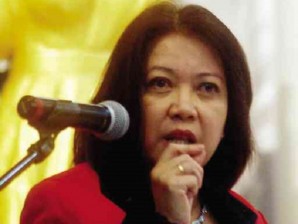MANILA, Philippines—The Judicial and Bar Council (JBC) has returned its final list of nominees to the vacancy in the Sandiganbayan antigraft court back to Malacañang, saying it would not entertain any further recommendees for the post.
“We do not read anything in the Constitution that authorizes the JBC, once it submits a list of recommendees, to revisit the same, even under changed circumstances. We also see no process for ‘confirmation’ by the JBC of any list of recommendees, if the list has been transmitted officially through the appropriate channels,” said Chief Justice Ma. Lourdes Sereno, ex officio JBC chair, in a letter to Executive Secretary Paquito Ochoa dated June 19.
Ochoa had written to Sereno earlier that day, returning the list of recommendees that the JBC had officially transmitted to the Office of the President last Feb. 28, and asking the JBC to further review and evaluate the recommendees, long after the 90-day deadline for President Aquino to fill the post had lapsed.
Sereno replied that the JBC had already finished its constitutional duty to come out with a list and was forthwith returning the list to Malacañang.
The President was supposed to have appointed by May 29 a new Sandiganbayan justice from the short list submitted by the JBC. The vacancy was caused by the promotion of Justice Amparo Cabotaje-Tang to presiding justice last October.
The JBC’s recommendees were Regional Trial Court Judges Ma. Theresa Dolores Gomez-Estoesta of Manila, Maryann Corpus-Manalac and Andres Soriano of Makati, Bernelito Fernandez of Quezon City, and Ronaldo Martin of Antipolo; Chief State Counsel Ricardo Paras III; justice department Undersecretary Leah Armamento; and Assistant Solicitor General Marissa Macaraig Guillen.
Deputy presidential spokesperson Abigail Valte yesterday explained that the executive department did not return the short list to the JBC but merely made clarifications about a nominee recommended by Sen. Juan Ponce Enrile.
Enrile, who has been indicted for plunder in connection with the P10-billion pork barrel scam, had endorsed Fernandez for the post.
The executive department merely wanted to know more about the nominees after Enrile’s name came up, but the President would go ahead in appointing a new associate justice from the JBC list, Valte said.
“He intends to [make the appointment],” she told reporters at a Palace briefing.
Valte was hard put to explain whether the executive department had violated the 90-day period for filling up a vacancy as provided for in the Constitution.
“You know we feel that because of the extraordinary circumstances that are attendant in this particular case, we recognize the urgency. And that’s why we wanted further assistance from the JBC,” she said.
Valte said that the executive department, through Ochoa, had sought out the JBC after finding out that Enrile had recommended one of the nominees.
Enrile, in a June 5, 2012, letter to the President, endorsed Fernandez for the post of associate justice in the antigraft court.
This stopped the President from making the appointment, “that someone is applying for a position in the very court that will try the person who made the recommendation in his favor,” Valte said.
The discovery also led to many questions, such as “how many accused stand to be tried for the Priority Development Assistance Fund-related cases, who the respondents are, as well as were there any other endorsements made in favor of all the others that are part of the short list,” she added.
In his June 19 letter to Sereno, Ochoa said the President needed to know if the council was still nominating the nominee recommended by Enrile.
He also requested the JBC to provide more information on the other nominees such as their past and present affiliations, if any, with the senators or congressional representatives charged in the Sandiganbayan.
Ochoa said Mr. Aquino required more information so he could make an “intelligent and wise choice” since the nominees’ personal data sheets were insufficient.
“The nominee to be appointed has to be, like Caesar’s wife, completely above suspicion,” he said.
The seven-member JBC screens applicants and nominees for vacancies in the antigraft court, as well as in the Supreme Court, Court of Appeals and the regional trial courts.
RELATED STORIES
Did you know: Judicial and Bar Council
JBC to get Islamic law consultant
